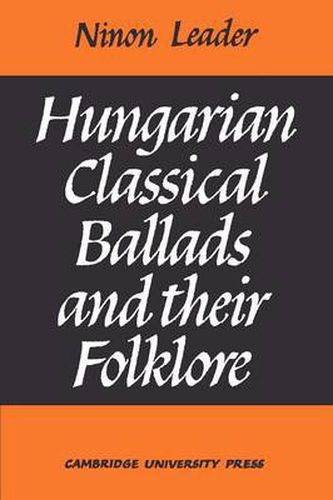Readings Newsletter
Become a Readings Member to make your shopping experience even easier.
Sign in or sign up for free!
You’re not far away from qualifying for FREE standard shipping within Australia
You’ve qualified for FREE standard shipping within Australia
The cart is loading…






Although Hungarian ballads were first collected about a hundred years before this book was first published in 1967, they have remained largely unknown to Western scholars. This was the first comprehensive study of the Hungarian material in any major European language. Dr Leader provides an analytic description and full English text of the main Hungarian classical ballads with their published versions. She examines their characteristics, analyses their themes, motifs and underlying folk beliefs, and relates them to ballads of other countries, particularly England and Scotland. This pioneer work suggested fresh interpretations and solutions to the problems of Hungarian ballad scholarship and enlarged the study of international ballads by making the Magyar material available in translation. It had repercussions on a wide range of folklore studies and on the comparative study of European literatures, to which the oral narrative traditions serve as important groundwork.
$9.00 standard shipping within Australia
FREE standard shipping within Australia for orders over $100.00
Express & International shipping calculated at checkout
Although Hungarian ballads were first collected about a hundred years before this book was first published in 1967, they have remained largely unknown to Western scholars. This was the first comprehensive study of the Hungarian material in any major European language. Dr Leader provides an analytic description and full English text of the main Hungarian classical ballads with their published versions. She examines their characteristics, analyses their themes, motifs and underlying folk beliefs, and relates them to ballads of other countries, particularly England and Scotland. This pioneer work suggested fresh interpretations and solutions to the problems of Hungarian ballad scholarship and enlarged the study of international ballads by making the Magyar material available in translation. It had repercussions on a wide range of folklore studies and on the comparative study of European literatures, to which the oral narrative traditions serve as important groundwork.